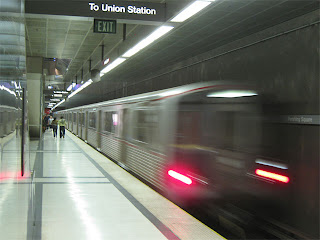NEW: I'm on KNBC TV supporting 1A and opposing 10.
On the four ballot measures next week about transportation and energy: YES on 1A
YES on 1A
Proposition 1A for California high-speed rail from San Francisco to Anaheim, with extensions to Sacramento and San Diego, would fund the state's $10B share to match private and federal money. Travel time from Los Angeles to San Francisco would be less than three hours.
Trains powered by domestic renewable electricity could reduce our oil dependence by 12.7 million barrels a year and eliminate 12 billion pounds of greenhouse gasses from many intra-state plane flights and long-distance car drives, using proven technology enjoyed in Europe and Asia.
This is the time to take high speed rail to its next step, investing in our infrastructure for California's economic future, like Governor Pat Brown's 1960s legacy. Is a $10 billion bond expensive? Not compared with highways and airport expansion, $6B to widen 99 to 6 lanes in the San Joaquin Valley, $20B to 8 lanes. And not compared with China's investment high speed rail for its place in the world economy.
Also see my earlier post on California High Speed Rail.
Links: Yes on 1A; Sierra Club on 1A; California High Speed Rail Blog; LA Times editorial  NO on 7
NO on 7
Proposition 7 has a laudable goal, but its critically flawed execution would set us back, the reason it's opposed by Sierra Club and other leading environmental groups – NRDC, Union of Concerned Scientists, California League of Conservation Voters; many in the renewable energy industry; the LA Times; and both political parties.
California already has a 20% Renewable Portfolio Standard (RPS) for 2010, and 33% for 2020, plus the statewide AB-32 plan to reduce global warming emissions to 1990 levels by 2020.
Prop. 7 does not address the real barriers to renewable energy – the need for reliable, predictable funding, such as a feed-in tariff – instead of creating rules for renewable contracts based on the unstable cost of baseload gas.
Its exclusion of less-than-30 MW providers (“solar and clean energy plant” is defined as a renewable energy generating “facility” with “a generating capacity of 30 Megawatts or more” in section 14) would cripple much of the renewables industry.
Its six-month “fast-track” provision would undermine environmental protections and existing collaboration on appropriate siting of renewable facilities and transmission corridors.
And it would be nearly impossible to correct these errors with its 2/3-majority legislative vote requirement.
Links: No on 7; Sierra Club on 7; LA Times editorial NO on 10
NO on 10
Proposition 10 would spend $5B ($10B with bond interest) of state taxpayers’ money to subsidize natural gas vehicles and fueling infrastructure.
Mostly funded by T. Boone Pickens’ natural gas fueling station company Clean Energy Fuels Corp – $3.7M as of Sept. 30 – it is a wrong direction to a dead-end.
The right solutions to Global Warming and to reduce our oil dependence especially include efficiency, and electric vehicles and plug-in hybrids (PHEVs) that can use renewable electricity from wind, solar, and geothermal. One-third (36%) of California's greenhouse gas emissions are from from cars and trucks, and half of U.S. oil is used for motor gasoline.
Natural gas is merely another depleting fossil fuel. It provides little benefit toward the goal of 80% reduction in Global Warming emissions by 2050. In fact, it is 40% more efficient to make electricity for electric cars from gas than burn it in cars.
Proposition 10 is opposed by major environmental groups – Sierra Club, NRDC, Union of Concerned Scientists, California League of Conservation Voters – and over 30 newspapers. The LA Times called it a “reprehensible scam.”
Links: No on 10; Sierra Club on 10; LA Times editorial YES on R
YES on R
Measure R is a proposed half-cent 30-year Los Angeles County transportation sales tax.
Los Angeles County’s transportation needs far exceed existing local, state, and federal funding, and the political climate both in the state and in Washington DC is not likely to increase those levels any time soon. That is why this comprehensive countywide plan was developed, in consultation with a coalition of transit, environmental, labor, and business groups.
Two-thirds (65%) of Measure R will fund critical expansion of our rail transit network and transit operations. Bus riders will receive the benefits of a 70% annual increase over current bus operations funding, to reduce fare increases and improve service. And Local Return funds can support new bicycle and pedestrian projects.
See my earlier posts Metro's sales tax would fund... and Sales tax comments for more.
Links: Yes on Measure R; Metro on R; LA Times editorial
Wednesday, October 29, 2008
Proposition recommendations
Subscribe to:
Posts (Atom)